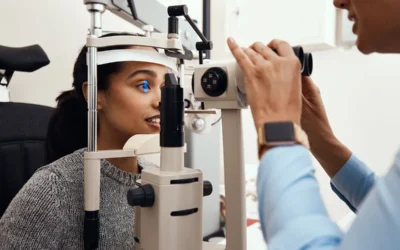Regular eye exams are crucial for maintaining good vision and overall eye health. At EyeQ Optical in Spokane, WA, we know that a comprehensive eye exam does more than just check your vision—it can also detect various eye conditions and other health issues. Let’s take a look at what a comprehensive eye exam can reveal and why it’s essential to schedule regular eye exams.
Detection of eye conditions
A comprehensive eye exam identifies refractive errors that impact your ability to see clearly. You may not even be aware you have a problem with your vision or need a change to your prescription, but may find yourself experiencing headaches, eye strain, and fatigue. Getting regular comprehensive eye exams ensures your prescription is up to date so that you can see clearly and comfortably.
Common refractive errors include:
- Nearsightedness (myopia): Difficulty seeing distant objects clearly.
- Farsightedness (hyperopia): Difficulty seeing close objects clearly.
- Astigmatism: Blurred vision due to an irregularly shaped cornea.
- Presbyopia: Age-related difficulty in seeing close objects clearly.
During a comprehensive eye exam, our eye doctor can also detect signs of eye diseases and conditions, some of which have no symptoms in the early stages. Examples of eye diseases which can be detected in a comprehensive eye exam include:
- Glaucoma: This condition causes damage to the optic nerve, often due to increased eye pressure. Early detection through a comprehensive eye exam can prevent serious vision loss.
- Cataracts: Clouding of the eye’s lens, leading to blurry vision. Regular comprehensive eye exams can help monitor the progression and determine the appropriate time for surgery.
- Macular degeneration: A disease that affects the central part of the retina (macula), leading to vision loss. Early detection is crucial for managing this condition effectively.
- Diabetic retinopathy: Damage to the blood vessels in the retina due to diabetes. Regular eye exams are vital for detecting and managing this condition, especially for individuals with diabetes.
Detection of systemic health issues
Your eyes are a window to your overall health! Did you know that the retina is the only place in the body where blood vessels can be seen directly without any invasive procedures? During an eye exam, an eye doctor not only spots refractive errors and signs of eye diseases but can also spot signs of other systemic issues.
Examples of systemic health issues include:
- Diabetes: Changes in the blood vessels in the retina can indicate diabetes. An eye exam can reveal early signs of this disease, prompting further medical evaluation.
- High blood pressure: Signs of hypertension can be detected through changes in the blood vessels in the retina. This condition can be spotted during a comprehensive eye exam, leading to timely intervention.
- Autoimmune disorders: Certain autoimmune diseases, such as lupus or rheumatoid arthritis, can affect the eyes. Symptoms like inflammation or changes in the retina can be detected during an eye exam.
What are the benefits of getting regular comprehensive eye exams?
Catching eye conditions and systemic diseases early allows for prompt treatment, which can prevent further complications and preserve your vision. Regular eye exams also ensure your prescription for glasses or contact lenses is up to date, providing optimal vision correction so you can achieve your best possible vision! Additionally, regular eye exams allow us to track the progression of any conditions and adjust treatment plans as necessary.
A comprehensive eye exam is vital for both maintaining both your eye health and overall well-being. At EyeQ Optical in Spokane, WA, we provide thorough eye exams that can detect a wide range of eye conditions and other health issues. Don’t wait until you experience vision problems—schedule your comprehensive eye exam today and keep your eyes healthy for years to come.



